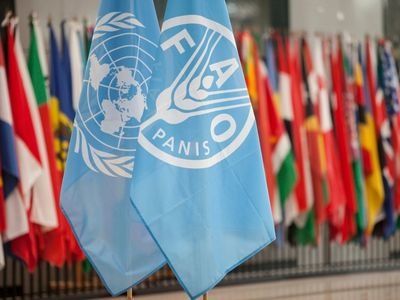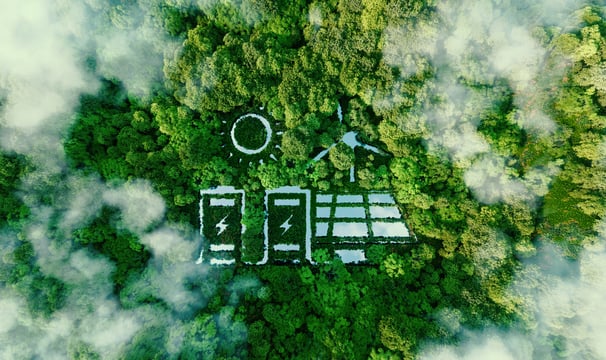

Primer: Climate change, biodiversity, and the energy transition:
The potential role of the UN's declaration on peasants' rights (UNDROP)
One Earth, Jan 2025
The UN Declaration on the Rights of Peasants and Other People Working in Rural Areas (UNDROP), adopted in 2018, recognizes peasants' rights to land, natural resources, and food sovereignty, impacting one-third of the world's population. This primer provides an overview of UNDROP, emphasizing its critical role in addressing the climate crisis, biodiversity loss, and energy transition. It explores how UNDROP can safeguard the rights of rural workers and Indigenous peoples, offering insights into its influence on global policy, international law, and human rights amid pressing social and environmental challenges.


Analysis Report: Analysis Report of Due Diligence Requirements of the EU Batteries Regulation 2023
Levin Sources/ Drive Sustainability, Jan 2024
This report provides an overview of the emerging due diligence obligations and ensuing recommended changes to common current due diligence practices of Drive Sustainability members, to support Drive Sustainability members to take an effective and efficient approach to implementing the EU Batteries Regulation.


Database: Resource Inventories and National Policy Actions to Accelerate the Supply of Energy Transition Minerals
The University of Queensland, 2023
This dataset contains resource inventories and policy actions to accelerate supply of Energy Transition Minerals (ETMs). 'Resource inventories' include over 3,000 ETM properties at different stages of development. 'Policy actions' include documents announced or adopted between 1.1.2020 and 30.4.2023. The dataset covers 18 key ETM countries, including Argentina, Australia, Bolivia, Brazil, Canada, Chile, DRC, Indonesia, Japan, Kazakhstan, Mexico, Mozambique, Myanmar, Peru, Philippines, Rwanda, Tanzania, and USA.


Peer-reviewed article: Misalignment between national resource inventories and policy actions drives unevenness in the energy transition
Nature Communications, Dec 2023
This study analyzes mining properties and national extraction policies (2020–2023) across 18 countries rich in energy transition minerals, assessing their alignment with mineral resource inventories. Findings reveal varied distribution and production-readiness of minerals, with OECD countries’ policies aligning more closely with demand than non-OECD counterparts. These disparities may delay global climate change mitigation and exacerbate an uneven energy transition, shaped by national resource endowments, wealth, and inequality, highlighting critical challenges for sustainable mineral supply chains.


Insight paper: What does effective human rights due diligence look like for SMEs?
UN Global Compact Deutschland, Dec 10, 2022
This publication highlights how the particularities of SMEs’ structure, ways of working and supply chains can prove an asset in establishing effective human rights due diligence.


Insight paper: What does effective human rights management look like? Five insights from practice
Deutsche Global Compact Netzwerk , Dec 2, 2021
The paper reflects on a decade of implementing the UN Guiding Principles on Business and Human Rights, identifying five key success factors for effective human rights risk management. It offers lessons and inspiration for business leaders to adopt strategic, incremental, embedded, collaborative, and rightsholder-focused approaches.


Report: Moving with responsibility towards success: Practical Implementation of Human Rights Due Diligence in 10 Companies
Federal Ministry for Economic Coop. and Development, Oct 2021
This study was commissioned by the Federal Ministry for Economic Cooperation and Development (BMZ) and the Deutsche Gesellschaft für Internationale Zusammenarbeit (GIZ) to demonstrate that human rights due diligence can work for companies of all shapes and sizes. It offers insights from ten pioneering companies, including DAX corporations like Daimler and Siemens with over 250,000 employees, as well as mid-sized firms like Bierbaum-Proenen and family-owned businesses like Thomas Becker Jewelry Atelier, demonstrating how business practices can align with human rights due diligence.


Business Guide: Worth Listening - Understanding and implementing human rights grievance mechanisms
UN Global Compact Network Germany, 2018
This business guide offers guidance on how to implement operational level grievance mechanisms.


Report: Human Rights Impact Assessment of the Coffee Sectors in Uganda, Kenya, the DRC, Rwanda, Ethiopia and Burundi
Institute for Human Rights and Business, 2017
This report summarizes the findings from a Human Rights Impact Assessment for the East African coffee-supply chain of Coop Denmark.


Report Series: Home Government Incentives Towards Responsible Business Conduct
Institute for Human Rights and Business, 2017
This series of reports seeks to highlight the range of tools that home states can use to incentivise responsible business conduct and discincentivise irresponsible conduct among extractive companies operating or potentially operating abroad. The report series looks at a range of different tools home states can use, focusing on (1) key international standards, (2) multi-stakeholder initiatives, (3) reporting requirements, (4) innovative new approaches and (5) the role of capital markets.


Briefing: Arbeitsmigranten im Baugewerbe im Persischen Golf
Business and Humam Rights Resource Centre, 2016
In the lead-up to the 2022 FIFA World Cup in Qatar, growing international attention focused on the country’s human rights situation, particularly concerning migrant workers involved in large-scale construction projects. The project examines how companies operating in Qatar and neighboring Gulf states can uphold human rights and labor standards in a challenging political and regulatory environment, in line with the UN Guiding Principles on Business and Human Rights, and explores how corporate responsibility can support societal development in the region.


Report: In Search of Policy Coherence - Aligning OECD Infrastructure Advice with Sustainable Development
Heinrich-Boell Foundation/ Institute for Human Rights and Business, 2016
Ahead of Germany's G20 presidency in 2017, the Heinrich Böll Foundation commissioned a review of OECD advice to the G20 on infrastructure investment, assessing whether it aligns with sustainable development goals (SDGs). The study found that OECD recommendations largely prioritize traditional economic growth over sustainability, with limited integration of environmental, social, and governance (ESG) considerations. The Foundation calls for stronger coherence between infrastructure policy and global sustainability commitments, urging Germany and the G20 to lead by example.


Briefing Note: Lessons Learned in Building Better National Action Plans on Business and Human Rights
Institute for Human Rights and Business, 2016
This Briefing Note seeks to enrich the development process for the Kenyan National Action Plan (NAP) by highlighting good practices from a range of countries that have adopted a NAP or are in the process of developing one.
Waleria Schuele
Advancing a just world through human rights.
Contacts
hello@waleriaschuele.com
+39 331 461 9165
